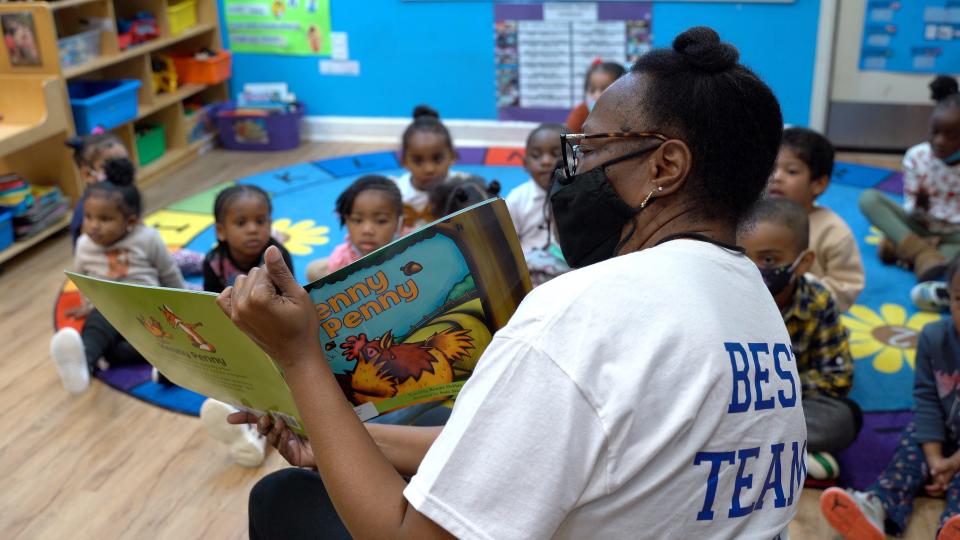Many Georgia childcare programs may need to up tuition — or close — as COVID funding ends
Beth Westergreen, director of the Early Learning Academy at Heritage Academy in Augusta, said her childcare program is $200,000 behind where they want to be as federal pandemic aid expires for a program where 80% of their 111 students are on scholarship.
"We just kind of trust the Lord and pray and are hopeful that it's going to be met, but we really have to go out and try to find other means of trying to get scholarships for these kids," she said.
As part of the American Rescue Plan, childcare providers in Georgia received more than $950 million in federal support across the state through the STABLE 4ward program to get providers through the worst of COVID. Heritage received about $300,000 of that money; about half went to staff, the other half for tuition relief. Now that program has stopped making monthly payments as of Sept. 30, creating challenges for childcare providers.
"Childcare was in distress prior to the pandemic. The pandemic, though, really (shined) a light on some of the structural issues with childcare," said Mindy Binderman, executive director for Georgia Early Education Alliance for Ready Students. "And there was a real concern that as childcare programs are forced to close for any amount of time due to pandemic illnesses, due to closures, that they might never reopen."
A survey of 684 childcare providers by the nonprofit Quality Care for Children in Georgia showed that 82% of them may need to increase tuition. About a quarter may have to close.
"The state did an incredible job, quite frankly, with those ARPA funds that came to our state saying, 'Let's get them out to the childcare community. Let's stabilize childcare,'" said Ellyn Cochran, president and CEO of QCC.
Childcare is often priced based on what parents can afford to pay, Cochran said, not what it costs to provide quality care, and pay is low. The ARPA funds provided assistance for a few years but could not fix the underlying challenge.
"Families who have care, I think they need to have open dialogue with their childcare providers to find out what it is that might be coming on the horizon for them, if anything," Cochran said.

Across Georgia: U.S. childcare funding nears cliff with no bridge ahead
Who was eligible for funds?
The program funds were distributed by the Department of Early Care and Learning in Georgia. Licensed childcare provider could apply, including childcare learning centers and homes, and funding was tied to attendance. The money could be spent on workforce support, tuition relief for families, operational supplies or food.
Once a provider received funding they could not apply again, according to Reggie Griffin, spokesperson for DECAL. The monthly payments have already ended, and providers will have until the end of June to spend the money they have.
County | Total STABLE 4ward aid |
Richmond | $21,768,135.00 |
Chatham | $34,656,700.00 |
Clarke | $8,808,052.00 |
Muscogee | $20,354,611.00 |
Fulton | $166,855,955.00 |
DeKalb | $82,293,541.00 |
Cobb | $79,698,418.00 |
Gwinnett | $95,936,312.00 |
Clayton | $34,130,533.00 |
Westergreen said that Heritage Academy was just ramping up their childcare program during COVID, which was an additional challenge, but the STABLE funding helped a lot.
"We don't hear a lot of good stuff around town," she said. "Sounds like a lot of a lot of people are hurting."
What comes next for Georgia childcare programs?
The STABLE awards were not the only funding that DECAL received to support childcare.
"It is definitely worth highlighting that even though childcare stabilization was the largest single pandemic relief initiative from a funding standpoint, it was just one of many critical initiatives intended to support families, communities, the ECE workforce, and childcare providers in the state," Griffin wrote in a statement. "While stabilization has ended, many of our initiatives are still ongoing."
The state already ran the CAPS program, which provides financial assistance to those who need help with childcare. But according to Cochran, only 14% of those who are income eligible actually receive the subsidy.
"What we continue to advocate for is programs that make childcare affordable and accessible and ensure that there's high quality," Binderman said. "We continue to advocate for more federal funds as well as state funding, prioritizing childcare scholarships for low income working families."
QCC has been working alongside DECAL to help providers to try and help them plan and budget more effectively, so providers can give not only great care but also manage their small business effectively. Some providers were able to use STABLE money to do this kind of back-end improvement. They are also working with employers to try and help fund childcare for their employees.
"We are hoping that with all the supports that we're providing with the resources we're doing, we're going to mitigate that by continuing to provide business support and coaching to childcare providers and access to families," Cochran said.
Westergreen says parents in her program should never know anything has changed.
"We were thankful for the STABLE money," she said. "We would love to have it again. But we're going to ... trust that it's going to come from some other direction if it doesn't come from there."
For those seeking help in finding childcare, QCC operates a helpline at 1-877-ALL-GA-KIDS (877-255-4254) or at qccga.org to connect parents to quality providers, and if necessary, help them apply for CAPS and other state assistance programs.
How much STABLE money did each Georgia facility get?
This searchable database shows how much funding each Georgia childcare facility received.
This article originally appeared on Augusta Chronicle: Georgia childcare funding: How much ARP money did facilities receive?

